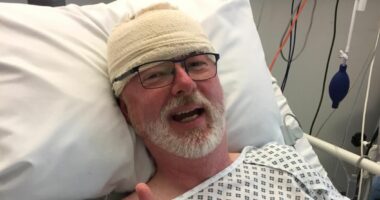Share this @internewscast.com
I’m 77 and my pharmacist told me that taking an omega-3 supplement would cut my risk of dementia. Is this true?
Dr Ellie Cannon replies: There is some evidence that fish oil – which contains omega-3 – can lower the risk of dementia, but there are other, more important, steps that should be taken to avoid the brain disease.
It is still unclear why dementia – the most common form of which is Alzheimer’s – occurs. And there are no effective treatments.
But there is strong evidence that certain lifestyle changes can drastically reduce the chances of a diagnosis in the first place.
In fact, according to the Lancet Commission, a group of dementia researchers who regularly publish a report setting out the steps patients can take to avoid the disease, nearly half of cases are preventable.

There is some evidence that fish oil – which contains omega-3 – can lower the risk of dementia, but there are other, more important, steps that should be taken to avoid the brain disease
Their research shows that not smoking, cutting down on excessive alcohol consumption, losing weight, regularly exercising and socialising (to promote brain stimulation) can all lower the risk of a diagnosis, as can reducing cholesterol levels and tackling high blood pressure.
If necessary, getting a hearing aid and effective glasses also help to protect patients from dementia, as they prevent the brain from straining itself and people feel more able to socialise.
There is growing evidence that a Mediterranean diet also lowers the chance of dementia. This involves eating plenty of fruit and vegetables while avoiding processed foods and excessive amounts of red meat. It also includes an ample amount of oily fish, meaning omega-3 – long-linked with improved brain function – is also crucial.
And it is true that getting omega-3 from a supplement is just as healthy as it is from eating fish. However, the Mediterranean diet and omega-3 are not included in the Lancet Commission’s list of anti-dementia steps to take.
While there are no downsides to taking a daily supplement of the ‘healthy fat’, patients who want to avoid dementia should focus on larger lifestyle changes such as those suggested above by the Lancet Commission.
I recently had radiotherapy for prostate cancer. It has left me with bowel and bladder problems but I feel too embarrassed to see my GP. What would you advise?
Dr Ellie replies: Unfortunately, bowel and bladder problems are common side-effects of prostate radiotherapy, but there are ways to manage them.
The prostate gland – where semen is produced – is close to the bowel and bladder, so radiotherapy can damage them.
Common symptoms are diarrhoea, excessive wind, pain and bleeding in the back passage, as well as urinary and faecal incontinence.
For many men, symptoms settle down within a few months of finishing treatment, but for some they can persist longer.
It is important that patients who experience these symptoms see a doctor as they may be unrelated to the radiotherapy. For example, bleeding from the rectum can be a sign of an infection or even bowel cancer.
There are drugs that GPs can prescribe to control diarrhoea and slow bowel movements. They can also refer patients to a local continence service with nurses who care for people with bowel problems. This might involve suggesting lifestyle changes – for example, eating low-fibre foods such as white rice and potatoes to reduce the urgency of bowel movements.
There are also exercises that patients can do to improve their urinary incontinence. If these steps fail, nurses can provide incontinence pads that hide the issue. Bowel problems can feel embarrassing and often lead to social isolation as patients worry about leaving the house.
My eye is bleeding and very painful. Painkiller drops don’t seem to help. What should I do?
Dr Ellie replies: Anyone with bleeding from the eye or severe pain there should urgently see a specialist, as their vision may be at risk.
One of the most common causes of eye bleeds is a vitreous haemorrhage (blood vessels bursting) but this is not usually painful. Instead, patients experience issues such as floaters – small dark spots in the vision. An optician or ophthalmologist can check.
Glaucoma (one of the most common causes of sight loss) can trigger eye pain but not usually bleeding. This is when the optic nerve connecting the eye and brain is damaged, leading to sight loss. It usually takes time but acute angle closure glaucoma can take just days, causes severe eye pain and requires urgent medical attention to avoid sight loss.
Another issue that causes severe eye pain is optic neuritis – an inflammation of the nerve at the back of the eye that can be an early sign of the progressive autoimmune condition multiple sclerosis.
But it is also caused by a virus, such as shingles, and if left untreated can lead to blindness.
- Do you have a question for Dr Ellie Cannon? Email DrEllie@mailonsunday.co.uk
















